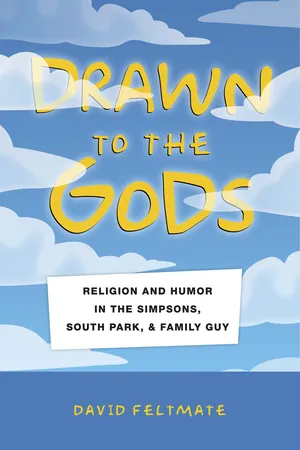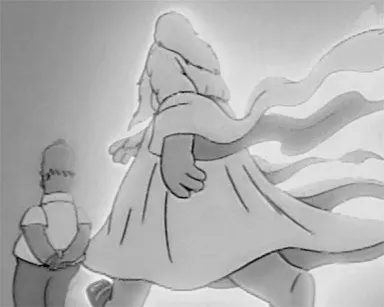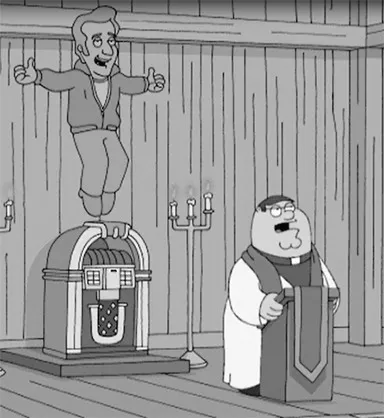![]()
1
Sacred Centers
Homer
So I figure I should just try to live right and worship you in my own way.
—Homer Simpson talks to God in The Simpsons’ “Homer the Heretic”
In The Simpsons episode “Homer the Heretic” Homer skips church on a cold, snowy morning while his family attends church and freezes miserably because the heater is broken. Homer dances around the house in his underwear (parodying Tom Cruise in Risky Business), watches football, and eats a waffle wrapped around a stick of butter and served on a toothpick. He attributes his great morning to missing church and vows never to go again. Marge is upset, but Homer is adamant. Later, when God visits Homer in a dream and accuses him of forsaking his church, Homer defends himself, saying, “I’m not a bad guy. I work hard and I love my kids. So why should I spend half my Sunday hearing about how I’m going to hell?” God agrees that Homer has a point. He allows Homer to worship him in his own way before disappearing to appear in a tortilla in Mexico.
This encounter convinces Homer of his decision. He walks around his backyard dressed like St. Francis of Assisi, creates fake holidays to get out of work, refuses to give money to local entertainer Krusty the Clown for the Brotherhood of Jewish Clowns, insults Apu by offering his murti of Ganesha a peanut, and is chased by the Flanders clan who try to bring him back to the church by singing the Sunday school song “The Lord Said to Noah.” Falling asleep the next Sunday morning, Homer accidentally sets his house on fire, only to have Ned Flanders and the Springfield Volunteer Fire Department—including Krusty and Apu—rescue him. Homer’s explanation for the fire is simple: “The Lord is vengeful.” Reverend Lovejoy disagrees, asserting that God “was working in the hearts of your friends and neighbors when they went to your aid, be they Christian, Jew, or miscellaneous [Hindu].” Reverend Lovejoy convinces Homer to return to the church and Homer is there the next week, front row center—asleep and snoring loudly. The episode ends with Homer dreaming that he is in heaven, walking with God, who consoles Homer, saying, “Don’t feel bad, Homer. Nine out of ten religions fail in their first year.” Homer’s personal walk with God matters, not his relationship with the church.
We cannot understand satire without understanding the satirist’s moral core, and we cannot get to those cores without studying episodes that present some religious behaviors positively. Evaluations of religion are based on the values each program holds sacred. These values are often teased out through comparisons between good religious practice and bad religions, with Christianity treated especially negatively. “Homer the Heretic” is the best place to start our investigation of the three programs’ sacred centers.
Spiritual Seeking in The Simpsons and Family Guy
There is no shortage of interpretations of “Homer the Heretic” and each discussion highlights different religious tensions and anxieties from the broader culture that are reflected in Homer’s choice. Journalist Mark Pinsky argues that “Homer the Heretic” is built around the question of how God wants to be worshipped and the intrafamily struggles about how to raise children when parents are unequally committed.1 The small group study guide he co-authored with Pastor Samuel F. Parvin uses this episode to argue for the importance of having a relationship with God and belonging to a faith community.2 Journalist Steven Keslowitz suggests the episode demonstrates that morality can be achieved apart from religion, but that religion is useful for forging communal bonds.3 Religion scholar Gordon Lynch treats it as a discourse on American interfaith dialogue, arguing that it promotes different religions working together for the common good.4 William Romanowski, a scholar of religion and mass media, uses Homer’s decision to stay home to capture American religious individualism, while theologian Jamie Heit employs this episode to illustrate how Americans are leaving Christianity for individualized spirituality, a position he deems perilous.5 Journalist Chris Turner, on the other hand, thinks “Homer the Heretic” is an attempt to strike a balance between fundamentalist and faithless extremes, contending that, in contrast to the Flanders, in the Simpson household “faith is flexible, responsive, debatable, alive.”6 Cultural studies scholar Matthew Henry writes that the episode is an extended critique of fundamentalist, institutionalized religion.7 For religious studies scholar Lisle Dalton and his associates it coalesces the program’s many religious themes: “Against the backdrop of declining religious authority, increasing personal choice, and ‘flattening’ of doctrines into more palatable themes, television presents revamped morality plays such as this in which personal piety, religious pluralism, and sincere goodness rate higher than denominational adherence and church attendance.”8 Dalton and his associates hit upon this episode’s significance for understanding the larger world of The Simpsons. To find the religion jokes in “Homer the Heretic” funny you have to at least entertain the belief that all religions are comparable and that devotion to a set of institutional guidelines is foolish. You also have to believe that a relationship with God to further your spiritual development is personally beneficial.
“Homer the Heretic” presents the common American distinction between “religion” and “spirituality.” Individuals often maintain that they can be spiritual without being religious. Central to this notion is the idea that spirituality is something people craft for themselves by drawing from the world’s religious traditions. Sociologist of religion Wade Clark Roof calls spiritual seekers bricoleurs because they “cobble together a religious world from available images, symbols, moral codes, and doctrines, thereby exercising considerable agency in defining and shaping what is considered to be religiously meaningful.”9 Personal spirituality draws upon numerous sources. For example, in Habits of the Heart, sociologist Robert Bellah and his associates provide the classic example of Sheilaism, named after interviewee Sheila Larson’s private faith, which was crafted from various external sources and her personal experiences and constituted belief in God without attending church.10 Yet, most conceptions of spirituality share three common characteristics. First, spirituality tends to be immanentist—its meaning and authority are found within the individual and not in institutional doctrines and dogmas. Second, spirituality often features a metaphysical connection between a supernatural force or power and the individual, with the force imparting special teaching and insight. Third, spirituality is often seen to apply to the concerns of everyday life.11 In The Simpsons these characteristics are mobilized through ignorant familiarity to generate institutional consonance—as noted earlier, institutional consonance occurs when new ideas are considered legitimate and build upon already held beliefs, and ideas are integrated into preexisting plausibility structures. The trend toward a focus on spirituality versus organized religion resonates with the value Americans place on individualism and reinforces a moral boundary against traditions that require participants to stifle their individualism for dogma.
The significance of “Homer the Heretic” lies in the fact that Homer finds spiritual awareness within himself and legitimates his spirituality through his desires. When God approves of Homer worshipping in his own way, Homer has all the justification he needs to avoid things he deems undesirable—like going to church. Jokes in this episode promote relativism, thereby facilitating spiritual seeking. For example, after Homer makes his decision he asks Marge, “What if we picked the wrong religion? Each week we’re just making God madder and madder.” Bart, who also wants to stop going to church, claps his hands and exclaims, “Testify!,” parodying evangelical revivals. On the DVD commentary, producer Al Jean suggests that Homer’s question is relevant, but its importance lies in relativism’s corrosive effects on religious certainty. Maintaining certainty in the face of great and legitimate religious diversity is difficult. The First Amendment’s right to religious freedom ensures that there will always be challenges to religious plausibility. The Simpsons suggests through its jokes that we should embrace relativism and find our own ways. Through seeking, searching, and the ability and willingness to change traditions, spirituality is legitimated in this episode’s jokes because it appears more authentic than the church’s rote repetition. This religious flexibility is characteristic of baby boomer religion, which is hardly surprising when we consider that The Simpsons’ writers and producers are boomers or boomers’ children.12 The Simpsons draws upon ideas that undermine religious exclusivity and adopts a perspective that all religions are equally valid—even ones concocted by lazy egoists who want to stay at home, drink beer, and watch television. To be spiritual Homer had to leave and find a religion that enabled him to be himself.
Family Guy’s episode “The Father, the Son, and the Holy Fonz” echoes “Homer the Heretic,” but Family Guy has Peter form his own church dedicated to the worship of Arthur Fonzarelli of Happy Days (ABC 1974–1984) fame.13 Disillusioned with his devout father Francis Griffin’s Catholicism and straying from the generic Christianity the Griffins normally practice (sometimes it is Catholic, other times Protestant), he decides to find his own religion. After Peter tries the Latter Day Saints (LDS), Jehovah’s Witnesses, and Hinduism, the belligerent and intolerant Irish Catholic Francis challenges his despondent son saying, “You want to find religion? All you got to do is look in your heart. Who’s always been there for ya, offering wisdom and truth? You’ve known him all along son, now worship him!” Peter has a sudden revelation and prays to Fonzie for a sign. A naked Lindsay Lohan then rings the doorbell and crabwalks into the house. Peter’s new religion is confirmed as he exalts, “Fonzie be praised!”
Like Homer, Peter starts his own religion. Peter’s is different because he establishes a church and has people visit a renovated barn that has stained glass windows featuring the characters from Happy Days and a statue of the Fonz hanging on the back wall, smiling, with his arms stretched to the side with two thumbs pointed straight up.
The visual reference to a crucifix is intentional, as MacFarlane notes on the DVD commentary that Fonzie was originally hanging from a cross, but censors made them remove it. Peter wears a priest’s robes, speaks in King James English, and tells his congregation to “all rise” before telling them to “now sit on it” like the Fonz. People are attracted to this religion. Francis, however, thinks it is an abomination and tries to drive Peter away from his newly established church—a move Brian supports. Eventually, the two convince characters from television’s past to form their own religions and Peter’s flock leaves him. Although Peter is depressed at the episode’s conclusion, Lois cheers him up since he was “preaching honesty, friendship, courage, and if you managed to inspire even one person to embrace those values, then you were a success.” Although Peter is skeptical, we learn that he inspired Francis to do just that as he prays in front of Fonzie’s picture at the episode’s conclusion.
As The Simpsons’ creative team did in “Homer the Heretic,” Family Guy’s team has Peter leave Christianity in search of a more personal faith. There are some substantial differences—Peter’s founding of a church as opposed to Homer’s individualism—but the basic premise of free-form spiritual experimentation remains. Homer and Peter each look inside themselves and find that popular culture and their basest desires meet their needs. Homer wants to eat, watch television, and sleep in on Sundays. Peter wants to relive Happy Days without the emotional baggage accompanying his father’s Catholicism. These practices are not condemned in the programs, even as the religions fade away after the week’s hijinks. God consoles Homer and Peter has made a substantial change in his father’s life. Later, when we consider how Family Guy has approached religion in more recent seasons, we will see that this portrayal is practically benevolent compared with later treatments. Christianity is treated roughly in “The Father, the Son, and the Holy Fonz” as Francis is verbally abusive (he calls Lois a “Protestant whore”), but Peter’s teachings...


